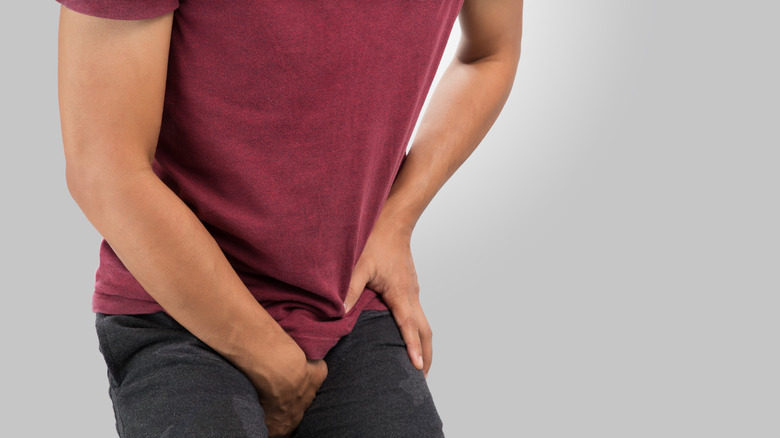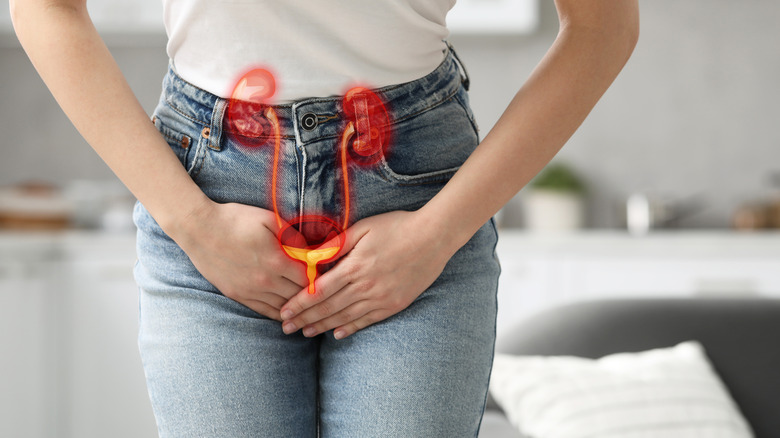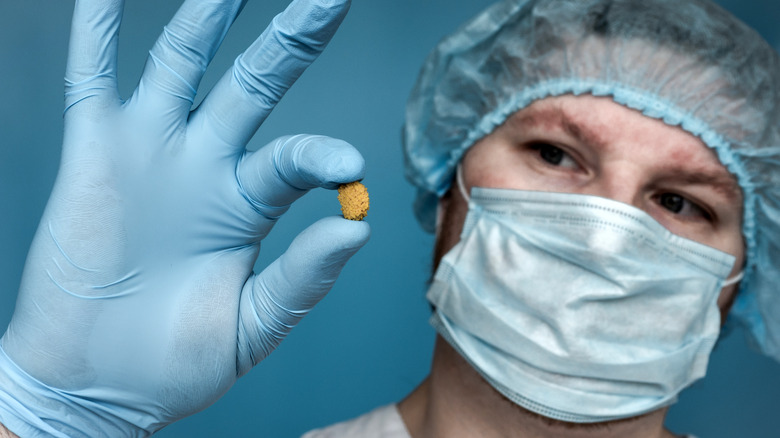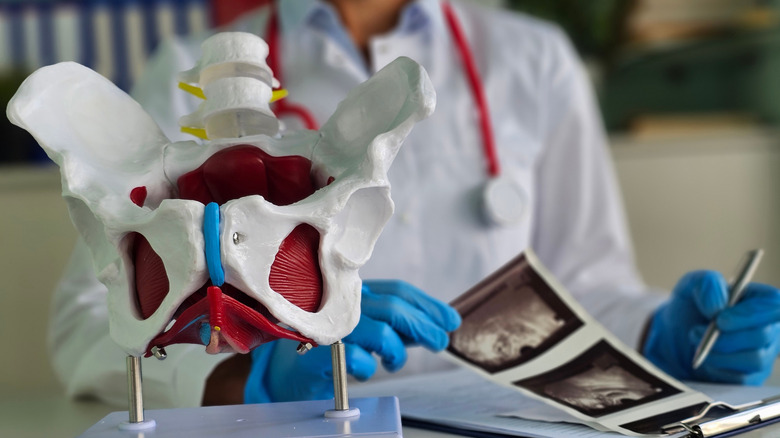4 Ways Holding In Urine Is Bad For Your Bladder And Your Overall Health
When you've got to go, you've got to go, but sometimes circumstances get in the way. You might be in the midst of an event you can't get out of, stuck in a space with no clean restroom, or worried about the asparagus smell of urine you got from dinner. Whatever the case may be, holding in your urine is never ideal, and everyone knows how serious the discomfort of a full bladder can be. Despite the discomfort, a pelvic cramp is the least of your concerns. If you hold in your pee for too long too often, it could cause medical issues that last a lifetime. To protect yourself, you need to know the limits of your bladder.
You should be peeing about seven times each day, and it should happen regularly, ideally at three or four-hour intervals. That's assuming you're drinking the right amount of water; long intervals between peeing can indicate dehydration. It's okay if you don't pee on an exact three to four-hour schedule, but you shouldn't stray more than a couple of hours outside that time frame. An average adult bladder can hold between one and two cups, and it typically takes nine to 10 hours to produce that much urine. If you hold your pee for longer than that, your bladder can go into a state of urinary retention, meaning you cannot pee even if you try. Eventually, a backup of urine could cause these serious side effects.
Urinary tract infections
Holding in your pee greatly heightens your risk of a urinary tract infection, or UTI. A UTI is caused by bacteria entering the urinary tract. It causes inflammation of the urethra and bladder, causing pelvic pain and a burning sensation when you pee. It can also cause you to feel like you have to pee more often than you actually do, and can even lead to incontinence issues.
Your urine shouldn't have any bacteria in it actually, but sometimes bacteria from outside the body can enter the bladder by moving up the urethra. UTIs occur more commonly in women because their urethras are shorter, meaning bacteria reach the bladder much more readily. The longer you hold in your urine, the more bacteria will build up in your bladder. This greatly heightens your odds of getting a UTI, so it is important to keep fluids moving through your body by both hydrating and peeing regularly.
Kidney stones
The bladder is the organ we think of when we feel the urge to pee, but it is only one part of the excretory system, one of the 10 major body systems, and it's not the only thing affected by holding in your pee. The kidneys, vital organs in the excretory system, are vulnerable as well. There is a high risk of kidney stones in particular, which develop when the minerals in your urine, particularly calcium, become too concentrated in your kidneys. Allowing urine to build up in your bladder without regularly releasing it will cause more and more minerals to build up in your kidneys.
When your system becomes overstuffed with pee, those minerals clump together to form stones, which range from the size of a grain of sand up to the size of a pea. Eventually, the stone needs to come out, and its only exit point is the urethra. Peeing out a kidney stone can be very painful, especially for men on account of their having longer urethras. In extreme cases, kidney stones can become so large that they must be removed via surgery. The best way to avoid this is to maintain a steady flow of fluids through your body, both through intake and output.
Pelvic muscle damage
Your pelvis is packed with organs that are vital for your digestive, urinary, and reproductive functions. It holds the bowels and bladder, as well as the uterus in biological females and the prostate in biological males. These organs can't just be suspended in empty space, and they rely on the support of a collection of muscles called the pelvic floor muscles. They extend from the pubic bone in front to the base of the spine in the back, and they control the ability to pee and poop. They are also the base of sexual functions, including the ability to achieve an erection, give birth, and have an orgasm. Needless to say, these are muscles we really want to keep healthy, and regular urination is absolutely essential for that.
Holding in your urine puts a strain on your pelvic floor muscles, so much so that they can become dysfunctional. Peeing relaxes the pelvic floor muscles, but if you keep it in for too long, those muscles lose the ability to relax when you want them to. This is called a hypertonic pelvic floor, and it causes the pelvic floor muscles to spasm uncontrollably. This leads to irregular urination where you either pee uncontrollably or can't pee at all. It can also cause pelvic pain, constipation, and erectile dysfunction.
Distended bladder
There are a lot of great facts about the bladder, but it certainly has its limits, particularly when it comes to max capacity. As previously stated, your bladder can hold about two cups of pee, and it takes roughly 10 hours to hit that limit. That is as far as your bladder is meant to stretch, and pushing it beyond its capacity can cause perhaps the most serious side effect of holding in your pee too long. The medical term for an overstretched bladder is a distended bladder. This is usually accompanied by a condition called bladder hypertrophy, in which the walls of the bladder thicken. This can cause you to feel a constant need to pee. It also makes it difficult to pee when you really need to because it weakens the flow of urine.
Here's the most serious part about a distended bladder: Once the bladder muscles stretch and thicken, there is no way for them to return back to normal. Since the bladder is no longer able to contract as normal, this condition can make it difficult to pee at all, leading to an even worse backup of urine that can reach up the kidneys, causing kidney damage. A catheter is often required to manage a distended bladder. In extreme cases, surgery may be required to remove a portion of the bladder tissue.
None of these conditions are likely to be life threatening, but they can take a serious toll on quality of life, so keep that pee flowing.




